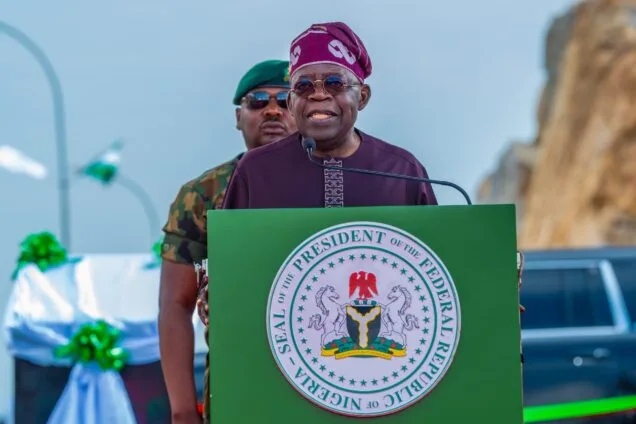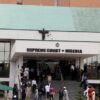President Bola Tinubu has assured Nigerians of his administration’s unwavering commitment to boosting food production and reducing inflation on food and medicine to 15% in 2025, while strengthening the national economy.
In his New Year message to the nation, Tinubu pointed to several positive economic indicators, such as lower fuel prices, growing foreign reserves, and a stronger Naira, which reflect the progress made in 2024 and will continue into 2025.
“Though 2024 posed numerous challenges for our citizens and households, I am confident that the New Year will bring brighter days,” said the President. “Economic indicators suggest a positive and encouraging outlook. Fuel prices have gradually decreased, foreign trade surpluses were recorded for three consecutive quarters, foreign reserves are rising, and the Naira has strengthened against the US dollar, providing greater stability.”
The President also highlighted the impressive growth of Nigeria’s stock market, which has generated trillions of naira in wealth, and noted the influx of foreign investment, reflecting renewed confidence in the country’s economic outlook.
However, he acknowledged that the cost of food and essential drugs remained a serious concern for many households in 2024. In response, he promised to intensify efforts to lower inflation from its current rate of 34.6% to 15%, focusing on boosting food production and encouraging the local manufacturing of essential drugs and medical supplies.
“In 2025, our government will work hard to reduce these costs, strengthen food production, and promote local manufacturing of vital drugs and other medical supplies,” Tinubu pledged. “We are determined to reduce inflation from its current high of 34.6% to 15%. With hard work and God’s guidance, we will achieve this goal and provide relief to our people.”
To further drive economic growth, Tinubu promised to increase access to credit for individuals and critical sectors, noting the establishment of the National Credit Guarantee Company. This initiative, which will begin operations before the end of the second quarter, will expand financial support through government and private-sector partnerships. It is expected to foster confidence in the financial system, boost credit access, and support underserved groups like women and youth.
The President urged governors and local council chairpersons to collaborate with the federal government on agricultural, livestock, and tax reforms to harness emerging opportunities. He commended states that have embraced the federal government’s Compressed Natural Gas initiative for public transport and those adopting electric vehicles as part of the national energy transition.
Tinubu also emphasized the importance of national unity and ethical values in advancing the Renewed Hope Agenda. He announced plans to unveil a National Values Charter in the first quarter of 2025, accompanied by a national orientation campaign aimed at fostering patriotism and shared values. He stressed that these efforts, aligned with the National Identity Project, would encourage citizens to work together to build a stronger nation.
Further reinforcing his commitment to youth involvement, Tinubu revealed that the Youth Confab announced in October 2024 would commence in the first quarter of 2025, with the Ministry of Youth soon to announce the selection process for youth representatives.
Tinubu expressed confidence in Nigeria’s economic trajectory, reaffirming his goal of building a $1 trillion economy. He urged citizens not to be distracted by divisive politics, ethnicity, or religion, emphasizing that the nation’s progress hinges on unity.
In his closing remarks, the President thanked Nigerians for their sacrifices and trust in his leadership, assuring them that 2025 would see significant strides toward achieving the nation’s goals.
“Thank you for your confidence in me as your President. Your trust humbles me, and I promise to serve you diligently and wholeheartedly. Together, let’s stay focused and united as we work toward building a prosperous Nigeria. May 2025 bring joy, success, and good health to all,” Tinubu said.
In contrast, the Peoples Democratic Party (PDP) criticized President Tinubu’s address, accusing the administration of failing to act on escalating insecurity, fuel shortages, and the ongoing food crisis. The PDP claimed that Tinubu’s speeches since May 2023 have been filled with rhetoric, unsubstantiated statistics, and unfulfilled promises, with no tangible steps to address the challenges facing the country.
In a statement, PDP National Publicity Secretary Debo Ologunagba urged the President to take immediate and concrete actions to tackle the rising fuel prices, hunger, and insecurity, and hold accountable those responsible for corruption and wasteful government spending. The PDP also demanded transparency regarding the funds generated from the removal of the fuel subsidy.
The opposition party expressed concern over unaddressed corruption within the ruling party and the lack of government action on reported state-backed killings, including the 2020 EndSars incident. The PDP cautioned that if the APC-led government continued its current approach, it would only exacerbate citizens’ frustration and dissatisfaction.
Despite the criticism, the PDP encouraged Nigerians to remain hopeful for the future, stay law-abiding, and approach the year 2025 with optimism.


